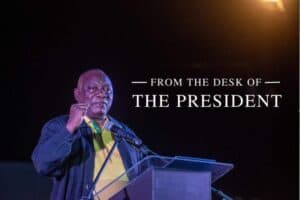Ongoing corruption and hopelessness to blame, say experts.

South Africans feel so “worried, powerless and disenfranchised” in an uncertain economic and political environment that they are afraid to spend, and this is partly responsible for pushing the country into a consumer-led recession after more than 20 years.
This is according to economists, who say the recession – announced yesterday by Statistics South Africa (Stats SA) – is partly due to lost consumer confidence.
“They see corruption and nothing being done about it. They see the good guys being gunned down. They are under stress,” economist Mike Schussler said.
He added that consumers were also not spending due to high inflation and job insecurity, with prices rising faster than salaries.
“But part of this has to do with the ongoing corruption and the hopelessness people feel around it.
“Businesspeople don’t trust the current government – the current consumer across all income groups feels under stress,” he said.
“When people don’t feel certain they don’t buy houses, cars, durable items. And this is across the income spectrum – people are cutting back, and it’s been going on for a while. They also see the empty spaces in stores and this makes them feel insecure. Take home pay doesn’t look good for consumers.”
Stats SA announced yesterday that the country’s economy slipped into recession, with the gross domestic product (GDP) growth rate being 0.7% in the first quarter of 2017.
“The largest negative contributor to growth in the GDP in the first quarter was the trade, catering and accommodation industry, which decreased by 5.9% and contributed -0.8 of a percentage point to GDP growth,” according to Stats SA.
“The manufacturing industry contracted by 3.7% and contributed -0.5 of a percentage point to GDP growth. Seven out of 10 divisions reported negative growth rates in the first quarter.”
The largest contributor to the decrease was the petroleum, chemical products, rubber and plastic products division.
Expenditure on real GDP fell by 0.8% in the first quarter of 2017, with household final consumption expenditure decreasing by 2.3% in the first quarter, contributing -1.4 percentage points to total growth.
National Treasury in a statement said following the “worse-than-expected GDP outcome”, Finance Minister Malusi Gigaba would seek a “meeting with business leaders soon to discuss ways of working together to achieve inclusive economic growth”.
“The current state of the economy puts more pressure on us as government, business, labour and broader society to intensify our growth programme and improve confidence as a matter of urgency to arrest the decline and set the economy on a higher growth trajectory,” it said.
“This worse-than-expected GDP outcome introduces significant downward bias to the GDP growth estimates communicated in the 2017 Budget Review, which projected 2017 GDP growth at 1.3 per cent.
“The current growth rate, if sustained, will lead to a further decline in GDP per capita and revenue, risking the sustainability of our fiscal framework and more importantly undermining the delivery of social services.”
Adding to the situation, Schussler said, was the axing of former finance minister Nhlanhla Nene by President Jacob Zuma in 2015, pushing the rand to an all-time-low – leaving South Africans shell-shocked.
“The inflation rate was because of the weakness of the rand, and that was because of politics.”
Pravin Gordhan then replaced Nene and was working on ratings agencies who at the time “were not happy with us”, he said.
Gordhan and former deputy finance minister Mcebisi Jonas were then axed earlier this year.
“So if you look at that, at least part of this is due to consumers losing confidence because of the weak rand. The middle class also sees there is no prospect of going up in a company. You are not getting the salary increases you saw before.
“There is the person on the factory floor as well, and that firm isn’t expanding any more. They see the emperor standingthere naked.”
Political economy analyst Zamikhaya Maseti also pointed to the drought, which cost more than 44 000 jobs in the first quarter of 2017.
“The global economy is also growing at a snail’s pace.”
South Africa’s recent downgrade also had “everything to do with political decisions”, Maseti said.
“And we are punished by ratings agencies – they can blame the downgrade on Zuma.
“It is because of the mismanagement of the economy and politics.”






